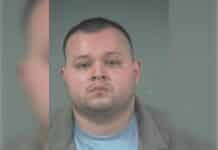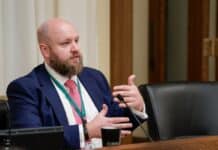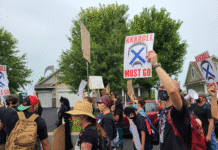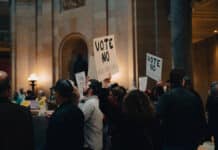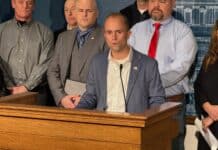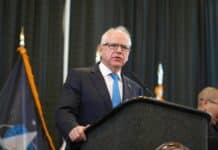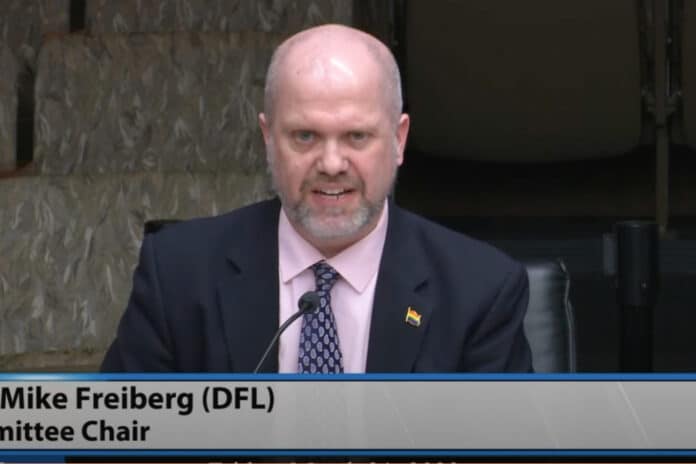
A long-debated political topic, “Is the Electoral College as a method of electing a president outdated?” has reared its head at the Minnesota Legislature.
DFLers in the House Elections Finance and Policy Committee have included a national popular vote provision in the elections omnibus bill they approved in a hearing late last month. That bill, HF1723, which contains a number of other contentious provisions, was approved on a party-line vote on March 31 that received no support from Republicans. DFLers, including House Elections Committee Chair Rep. Mike Freiberg, contend that Minnesotans are ready to move beyond the Electoral College.
“There is nothing sacrosanct in awarding the electoral votes to the winner of the popular vote within a state,” said Freiberg, DFL-Golden Valley, at a March 31 hearing on the elections omnibus bill, where much of the discussion focused on the national popular vote language included in the wide-ranging election reform legislation.
That provision is identical to the standalone bill, HF642, that the committee approved on a party-line vote in February. Freiberg, who sponsors that bill, told colleagues the national popular vote initiative reflects what “many people expect out of our election system, namely, the person with the most votes wins.”
But Republicans on the committee say that abandoning the Electoral College, which has been the method states have used in some capacity to determine the president for more than 200 years, would silence the voice individual states have in the process.
“Our Founders saw the strength in independent states and independent voices of each state,” said Rep. Matt Bliss, R-Pennington. “For the life of me I don’t know why we would put our election integrity in the hands of people in California, Alabama or New York. This is our election. We (as a state) decide where our electoral votes go.”
The proposed legislation would have Minnesota join 15 other states in the National Popular Vote Interstate Compact, and would take the nation one step closer to electing the president by a national popular vote, a departure from the Electoral College system.
State legislatures that have already signed onto the national popular vote compact include: Hawaii, Oregon, Washington, California, Colorado, New Mexico, Illinois, Maryland, Delaware, New Jersey, New York, Connecticut, Rhode Island, Massachusetts, and Vermont. The District of Columbia has also signed onto the compact. In sum those jurisdictions represent 195 of 538 electoral votes. In order for the national popular vote to go into effect as the way of choosing a president, states that sign onto the compact must total at least 270 votes, according the House research summary on the bill.
“An interstate compact is both a statute in each state that is member to the compact, and a contract between the member states. In order to formally ratify the compact, each state that wishes to become a party to the compact must adopt identical statutory language,” the summary states. Those entering into the compact would select electors that would award Minnesota’s 10 electoral votes to the winner of the national popular vote. Currently, the electors from Minnesota award votes to the winner of the popular vote in Minnesota.
Walz on record saying election reform bills need bipartisan support
While the national popular vote legislation is not included in a Senate version of the elections omnibus bill that is making its way through the legislature, the House version does have support from at least one Republican.
Rep. Pat Garofalo, R-Farmington, is the lone Republican legislator to date to support the bill out of 21 members in both chambers who have signed on as sponsors. Garofalo has been outspoken in his support for the National Popular Vote Interstate Compact for more than a decade. In 2014 he co-authored an opinion piece published in the Star Tribune that stumped for having Minnesota join the compact. Garofalo has sponsored the legislation in a number of sessions since he was elected to the House of Representatives. But it’s never been approved on the floor of either House or Senate.
With Gov. Tim Walz on record as saying that any election reform bills that come to his desk need bipartisan support before he would sign them into law, would Garofalo’s support constitute “bipartisan support?” Mike Freiberg thinks so.
“The national popular vote provision, the bill itself, has a current GOP House member as a co-author,” Freiberg said, addressing Republicans in the House elections committee who criticized the provision. “That would meet your threshold as to what constitutes bipartisan support.”
Hank Long
Hank Long is a journalism and communications professional whose writing career includes coverage of the Minnesota legislature, city and county governments and the commercial real estate industry. Hank received his undergraduate degree at the University of Minnesota, where he studied journalism, and his law degree at the University of St. Thomas. The Minnesota native lives in the Twin Cities with his wife and four children. His dream is to be around when the Vikings win the Super Bowl.


